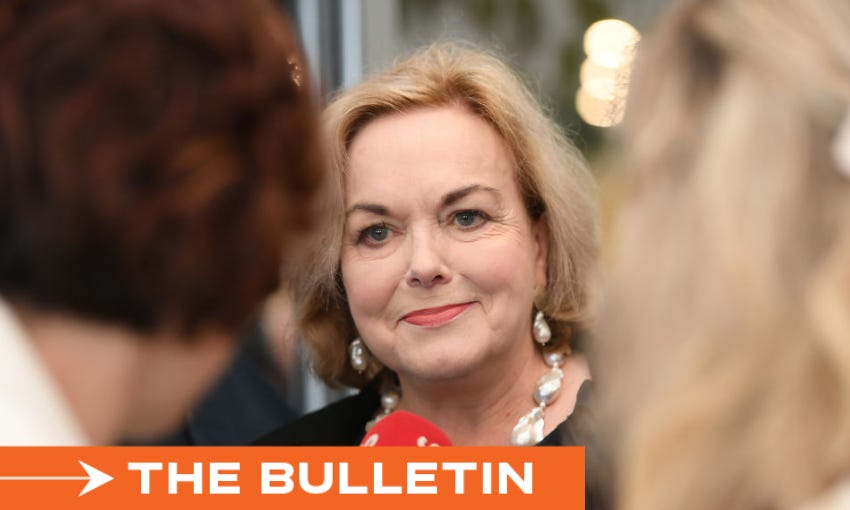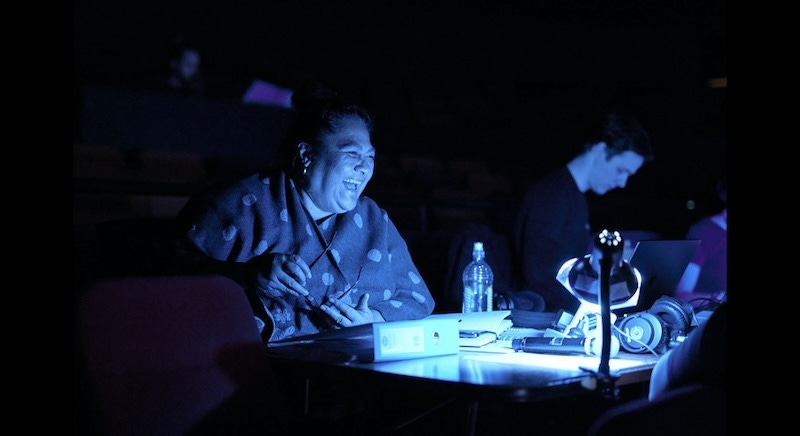What’s worse than a cut? Funding going to zero. Inside the fraught end of KiwiSaaS
The abrupt demise of a business support agency reveals a very different view of how government should relate to industry.
Mōrena, and welcome to The Bulletin for Thursday, June 27, a special edition written by Duncan Greive.
In today’s edition: Stalking bill speed-up, a landmark ruling from the ERA and a search for a 100-year cemetery. But first, The Spinoff’s founder reports on a funding cut you may have missed.
Head to The Spinoff for an extended edition of this Bulletin.
The backstory
KiwiSaaS was born late in 2021, with $11.2m in funding to function “as a community-building initiative to connect the businesses working in New Zealand’s SaaS sector”, according to the Ministry of Business, Innovation and Employment (MBIE). “SaaS” referring to software-as-a-service, or cloud software (think Xero). A year earlier, minister David Parker had announced funding of $216m for New Zealand Trade and Enterprise (NZTE).
These two covid-era funding streams expressed a more expansionist view of the relationship between government and business, but one broadly in line with that of the Helen Clark and John Key governments. It represented the apotheosis of a movement that had been steadily building for at least 20 years, since the famous Knowledge Wave conference, where hundreds of leaders, officials and academics discussed how best to lift New Zealand’s economic performance.
Its co-chair was then-prime minister Clark, who gave a speech sketching “a strong focus on entrepreneurship, the attraction and retention of talent, the transformation of public and private institutions, and incentives to promote innovation and creativity”.
A decade later this was the theme of Sir Paul Callaghan’s series of widely admired speeches, challenging New Zealand to become “the place that talent wants to live”. Hard sentiments to resist – but how to execute them?
The ideas became an array of initiatives, led by an agency in Sir Paul’s name, Callaghan Innovation. Some are small endeavours like a plethora of regional co-working spaces, California portal the Kiwi Landing Pad, and global brand agency NZ Story.
Others are much more substantial, such as an initiatives delivered through NZTE and NZ Growth Capital Partners, government-backed investment funds which are now more than 20 years old and have invested hundreds of millions of dollars into various businesses. The work is constant: just this week, The Spinoff’s Joel MacManus perceptively reported on Wellington’s desire to become a climate tech hub.
The intent of all this is broadly to stimulate a tech and innovation-centric economy that means New Zealand can weightlessly export its digital services and IP to the world. It’s one that all parties broadly agree on. What appears to be changing, is this government’s vision of its role in achieving that.
How to deliver it?
Consider KiwiSaaS. The agency was set up to promote the SaaS industry. Its funding runs out this Sunday, and Judith Collins, minister for science, innovation and technology, has declined to renew it.
When the funding first became imperilled in April, senior figures at a number of significant SaaS firms, including Xero, Parkable and LawVU signed a letter asking Collins to reconsider. The Taxpayers Union (TPU) critiqued the group, calling the request “crony capitalism”.
After declining its extension, Collins provided a statement to NZ Herald’s Chris Keall, saying “New Zealand already has a number of SaaS success stories… discussions have been happening with the sector to explore a future model for KiwiSaaS that is not dependent on government funding”.
This was not just a flinty right wing perspective. Former Xero exec Nick Houldsworth wrote on LinkedIn that “in the early days of SaaS in NZ there was no real government support, no Callaghan, few if any incubators, angel networks or other derivatives... None of that stopped the industry from taking off.”
A generational divide
This speaks to an emergent divide between different generations of New Zealand’s tech community. Houldsworth typifies older hands, some of whom view much of the government participation as nice-to-haves at best, if not a kind of talent drain which keeps good people from working on actual businesses.
Current startup founders The Bulletin has spoken with have a markedly different view, saying they feel that KiwiSaaS’ resources and events like annual conference Southern SaaS created a level of education and community to which they might not have otherwise had access to. They say that such international ambitions might be harder to achieve without that support.
Regardless, after 20 years of consistently expanding support, it appears that the coalition is much cooler on the government’s ability to impact business through initiatives like KiwiSaaS.
If not that, then what?
It’s not yet entirely clear what, if anything, will replace that approach. BusinessDesk’s Jem Traylen and Peter Griffin have been pulling that thread a little lately. Griffin published a withering assessment of Melissa Lee’s business development portfolio last week, concluding that “Lee will be little more than a sideline cheerleader for our export-orientated businesses”.
Traylen covered minister for small business and manufacturing, Andrew Bayly, and was similarly curious about his stated intention to focus less on a strategic plan, and instead to “do more stuff” – she found that hard to square with a budget that dedicated just $2m to manufacturing, which doesn’t buy much stuff.
A new direction?
Perhaps the only major initiative that hints at a fresh vision for the role of government is one which has barely gotten started. The ministry for regulation is an Act initiative and, despite its name, exists to find areas in which regulation is holding the country back (more properly it should be the ministry against regulation).
It functionally replaces the Productivity Commission, the last government attempt to fix our under-performing economy, which was shut down earlier this year. Will the ministry for regulation leave a more profound legacy?
It’s essentially about the government getting out of business’s way, for better or worse. A different way of approaching the same issue as that big, contentious fast track bill, recapped here by Shanti Mathias. Applications for the regulation ministry’s leadership closed earlier this month – the faint beginnings of a more modest new era in government’s conception of its relationship to business.
Burning home fires: Climate adaptation and the struggle for landback
"This is an invitation to have faith in something we can see, like smoke from a long-burning fire drifting slow across the sky."In our latest podcast with Te Kōmata o Te Tonga, Nadine Hura and Ruia Aperahama talk to researchers keeping their home fires burning about how they’re adapting to the changing climate. Read the pod's intro, here.
Stalking bill to be introduced by end of year
Justice minister Paul Goldsmith has vowed to introduce a bill that would make stalking illegal by the end of the year, rather than the end of the term as previously promised, RNZ reports. A petition was delivered to parliament – and accepted by Goldsmith – yesterday when he announced the speed-up. In 2020, The Spinoff published the account of a woman whose stalker went on to murder. A 2023 report from NZ Herald revealed reports of criminal harassment (stalking) had more than doubled from 2015 to 2021.
‘It’s about going into the unknown willingly, and troubleshooting along the way!’
Award-winning director and actor Anapela Polataivao ONZM takes us on a journey of creativity and courage in our first Art Work story. From Wild Dogs Under My Skirt to the upcoming Red White and Brass, she shows us how embracing the unknown is key to groundbreaking theatre. Discover her inspiring insights on commitment and creativity on The Spinoff now.
Click and Collect
On RNZ Night’s excellently-named Shower Thoughts segment, Emile Donovan investigates why rabbits are such a big problem in the South Island, but not so much up north.
BusinessDesk’s Victoria Young reports on a landmark ruling by the Employment Relations Authority against BNZ, after it found the bank fired an employee for reporting what she believed amounted to serious wrongdoing.
A quick explainer of Australia’s “watered down” strict laws against vaping – clearly New Zealand isn’t the only jurisdiction struggling to legislate the alternative cigarettes.
The government’s proposed law that would keep agricultural emissions out of the Emissions Trading Scheme has passed its first reading.
There are heaps of interesting statistics (increasing speed from 80km/h to 100km/h only saves 90 seconds on a 10km trip!) in this opinion piece about speed limit changes in The Press from Lin Roberts.
Fascinating reporting from Max Frethey about the Nelson and Tasman councils looking for a suitable space for a new cemetery that they want to provide capacity for 100 years.
Listen to episode three of Juggernaut – Uranium on Your Breath
In a tense and divided cold war world, David Lange emerges as an anti-nuclear champion, despite being out of contact, deep in the Pacific when the crisis strikes. The Americans are furious: didn’t the NZ PM pledge to smooth the waters in Labour to allow a US ship visit? They become even angrier when he takes the stage at the Oxford Union, to global acclaim. When an act of state terrorism sees a Greenpeace ship sunk and a photographer killed in Auckland harbour, the public mood on nukes only solidifies. Follow now to make sure you get every episode.
Juggernaut was made with the support of NZ On Air.
Right now on The Spinoff: 'Turd in a punchbowl': Toby Manhire talks to former member of the Reagan administration about the David Lange effect in the White House. Joel MacManus conducts a cost-benefit analysis of buying new Interislander ferries. Gone by Lunchtime wonders if New Zealand is a C-list country. Stacey Gregg crowns the world's best writer of food descriptions for The Spinoff Books Confessional. Nadine Hura reflects on how the indigenous 'land back' movement and climate adaptation are intrinsically linked. Gabi Lardies profiles 95bFM Breakfast host Rachel Ashby as she farewells the beloved radio station. Sean Dugdale-Martin reviews the Tīwhas Matariki Spectacular, full of energetic indigenous joy for a Māori new year.
Long weekend long reads
Staff writer Shanti Mathias’s pick of three long reads for Matariki (once you’ve read Eda Tang’s amazing piece about Dominion Road)
This Verge feature into a thrilling event: the Excel World Championships. Yes, that’s Microsoft Excel.
A fascinating article about the oldest ecosystems on earth - and how we focus on individual organisms over the longevity of whole habitats.
This insight into a South Island man who has felt compelled to participate in dozens of Search and Rescue operations – for free.
That’s it for The Bulletin today, thanks for reading.
Let me know in the comments, or get in touch with me at thebulletin@thespinoff.co.nz, if you have any feedback on today’s issue or anything in the news.
If you liked what you read today, share The Bulletin with friends, family and colleagues.















Thanks for sharing those long reads, very enjoyable!!!
As a former SAR searcher I totally relate to the long read about Mr Keen... Good stuff (article & Mr Keen!) 👏
What other funding "cuts" are going under the radar like KIWISAAS? Thanks for keeping an eye on these sneaky moves 👍🏾